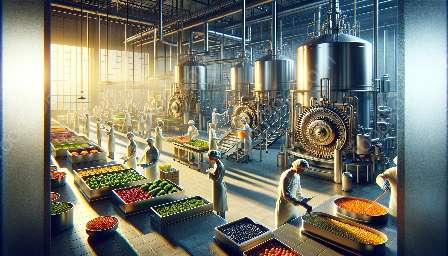Food chemistry is the study of the chemical processes and interactions that occur within various food ingredients, leading to the creation of diverse flavors, textures, and nutritional compositions. It plays a vital role in the culinary world and the food and drink industry, as it is the foundation for understanding the science behind food transformation and innovation.
Understanding Food Chemistry
At its core, food chemistry delves into the molecular structure of food components such as proteins, carbohydrates, lipids, vitamins, and minerals. The interactions between these components during food processing, cooking, and storage determine the sensory properties, stability, and nutritional value of the end products.
The Role of Culinology
Culinology, a blend of culinary arts and food science, applies principles of food chemistry to create innovative and delicious food products. It focuses on understanding the chemical reactions and transformations that occur during cooking and food preparation, leading to the development of new culinary techniques and flavor combinations.
Exploring Flavor Development
Food chemistry provides insights into the complex mechanisms underlying flavor perception. From the Maillard reaction responsible for the savory, roasted notes in cooked meats to the enzymatic reactions that produce fruity or floral aromas in fruits and vegetables, understanding these processes is crucial for creating captivating flavor profiles in culinary creations and food products.
Texture and Structure
The manipulation of food ingredients based on their chemical properties is integral to achieving desired textures and structures. Food chemists and culinologists work together to modify the characteristics of proteins, carbohydrates, and fats to create smooth, creamy textures in dairy products, airy and tender crumb structures in baked goods, and the perfect balance of chewiness and tenderness in meat products.
Food Chemistry in the Food and Drink Industry
Food and drink companies rely on food chemists to develop new products, improve existing formulations, and ensure the safety and quality of their offerings. From formulating low-sugar beverages to creating stable emulsions in salad dressings, food chemistry drives innovation and addresses consumer preferences for healthier and more flavorful options.
Packaging and Shelf Life
Understanding the chemical reactions that occur between food and its packaging materials is essential for preserving product quality and extending shelf life. Through the application of food chemistry principles, companies can develop packaging solutions that maintain the freshness and integrity of food products, ultimately reducing food waste.
Conclusion
Food chemistry is a dynamic field that continues to shape the way we perceive, prepare, and enjoy food. Its integration with culinology and its impact on the food and drink industry highlight the importance of understanding the scientific principles behind the foods we savor every day.




















